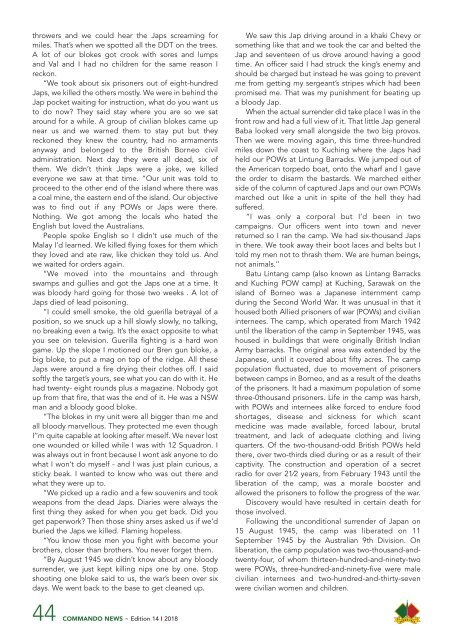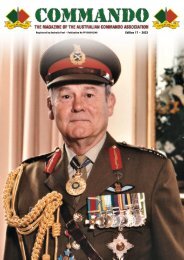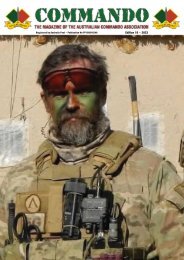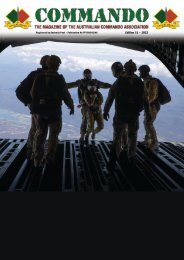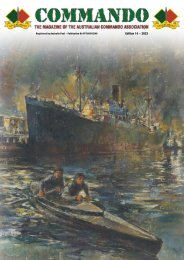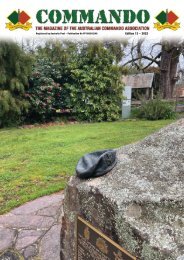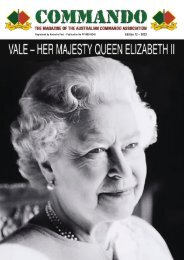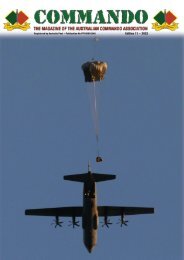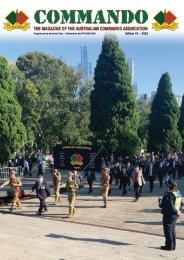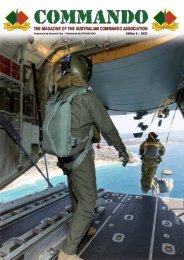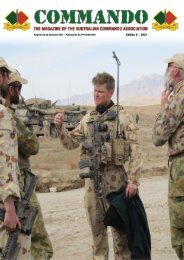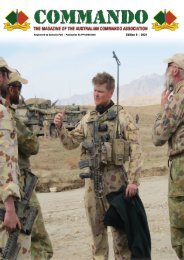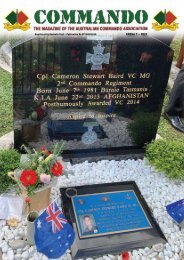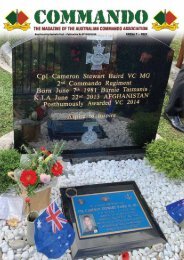Create successful ePaper yourself
Turn your PDF publications into a flip-book with our unique Google optimized e-Paper software.
throwers and we could hear the Japs screaming for<br />
miles. That’s when we spotted all the DDT on the trees.<br />
A lot of our blokes got crook with sores and lumps<br />
and Val and I had no children for the same reason I<br />
reckon.<br />
“We took about six prisoners out of eight-hundred<br />
Japs, we killed the others mostly. We were in behind the<br />
Jap pocket waiting for instruction, what do you want us<br />
to do now? They said stay where you are so we sat<br />
around for a while. A group of civilian blokes came up<br />
near us and we warned them to stay put but they<br />
reckoned they knew the country, had no armaments<br />
anyway and belonged to the British Borneo civil<br />
administration. Next day they were all dead, six of<br />
them. We didn’t think Japs were a joke, we killed<br />
everyone we saw at that time. “Our unit was told to<br />
proceed to the other end of the island where there was<br />
a coal mine, the eastern end of the island. Our objective<br />
was to find out if any POWs or Japs were there.<br />
Nothing. We got among the locals who hated the<br />
English but loved the <strong>Australia</strong>ns.<br />
People spoke English so I didn’t use much of the<br />
Malay I’d learned. We killed flying foxes for them which<br />
they loved and ate raw, like chicken they told us. And<br />
we waited for orders again.<br />
“We moved into the mountains and through<br />
swamps and gullies and got the Japs one at a time. It<br />
was bloody hard going for those two weeks . A lot of<br />
Japs died of lead poisoning.<br />
“I could smell smoke, the old guerilla betrayal of a<br />
position, so we snuck up a hill slowly slowly, no talking,<br />
no breaking even a twig. It’s the exact opposite to what<br />
you see on television. Guerilla fighting is a hard won<br />
game. Up the slope I motioned our Bren gun bloke, a<br />
big bloke, to put a mag on top of the ridge. All these<br />
Japs were around a fire drying their clothes off. I said<br />
softly the target’s yours, see what you can do with it. He<br />
had twenty- eight rounds plus a magazine. Nobody got<br />
up from that fire, that was the end of it. He was a NSW<br />
man and a bloody good bloke.<br />
“The blokes in my unit were all bigger than me and<br />
all bloody marvellous. They protected me even though<br />
I’’m quite capable at looking after meself. We never lost<br />
one wounded or killed while I was with 12 Squadron. I<br />
was always out in front because I wont ask anyone to do<br />
what I won’t do myself - and I was just plain curious, a<br />
sticky beak. I wanted to know who was out there and<br />
what they were up to.<br />
“We picked up a radio and a few souvenirs and took<br />
weapons from the dead Japs. Diaries were always the<br />
first thing they asked for when you get back. Did you<br />
get paperwork? Then those shiny arses asked us if we’d<br />
buried the Japs we killed. Flaming hopeless.<br />
“You know those men you fight with become your<br />
brothers, closer than brothers. You never forget them.<br />
“By August 1945 we didn’t know about any bloody<br />
surrender, we just kept killing nips one by one. Stop<br />
shooting one bloke said to us, the war’s been over six<br />
days. We went back to the base to get cleaned up.<br />
We saw this Jap driving around in a khaki Chevy or<br />
something like that and we took the car and belted the<br />
Jap and seventeen of us drove around having a good<br />
time. An officer said I had struck the king’s enemy and<br />
should be charged but instead he was going to prevent<br />
me from getting my sergeant’s stripes which had been<br />
promised me. That was my punishment for beating up<br />
a bloody Jap.<br />
When the actual surrender did take place I was in the<br />
front row and had a full view of it. That little Jap general<br />
Baba looked very small alongside the two big provos.<br />
Then we were moving again, this time three-hundred<br />
miles down the coast to Kuching where the Japs had<br />
held our POWs at Lintung Barracks. We jumped out of<br />
the American torpedo boat, onto the wharf and I gave<br />
the order to disarm the bastards. We marched either<br />
side of the column of captured Japs and our own POWs<br />
marched out like a unit in spite of the hell they had<br />
suffered.<br />
“I was only a corporal but I’d been in two<br />
campaigns. Our officers went into town and never<br />
returned so I ran the camp. We had six-thousand Japs<br />
in there. We took away their boot laces and belts but I<br />
told my men not to thrash them. We are human beings,<br />
not animals.’’<br />
Batu Lintang camp (also known as Lintang Barracks<br />
and Kuching POW camp) at Kuching, Sarawak on the<br />
island of Borneo was a Japanese internment camp<br />
during the Second World War. It was unusual in that it<br />
housed both Allied prisoners of war (POWs) and civilian<br />
internees. The camp, which operated from March 1942<br />
until the liberation of the camp in September 1945, was<br />
housed in buildings that were originally British Indian<br />
Army barracks. The original area was extended by the<br />
Japanese, until it covered about fifty acres. The camp<br />
population fluctuated, due to movement of prisoners<br />
between camps in Borneo, and as a result of the deaths<br />
of the prisoners. It had a maximum population of some<br />
three-0thousand prisoners. Life in the camp was harsh,<br />
with POWs and internees alike forced to endure food<br />
shortages, disease and sickness for which scant<br />
medicine was made available, forced labour, brutal<br />
treatment, and lack of adequate clothing and living<br />
quarters. Of the two-thousand-odd British POWs held<br />
there, over two-thirds died during or as a result of their<br />
captivity. The construction and operation of a secret<br />
radio for over 21⁄2 years, from February 1943 until the<br />
liberation of the camp, was a morale booster and<br />
allowed the prisoners to follow the progress of the war.<br />
Discovery would have resulted in certain death for<br />
those involved.<br />
Following the unconditional surrender of Japan on<br />
15 August 1945, the camp was liberated on 11<br />
September 1945 by the <strong>Australia</strong>n 9th Division. On<br />
liberation, the camp population was two-thousand-andtwenty-four,<br />
of whom thirteen-hundred-and-ninety-two<br />
were POWs, three-hundred-and-ninety-five were male<br />
civilian internees and two-hundred-and-thirty-seven<br />
were civilian women and children.<br />
44 COMMANDO NEWS ~ <strong>Edition</strong> <strong>14</strong> I <strong>2018</strong>


